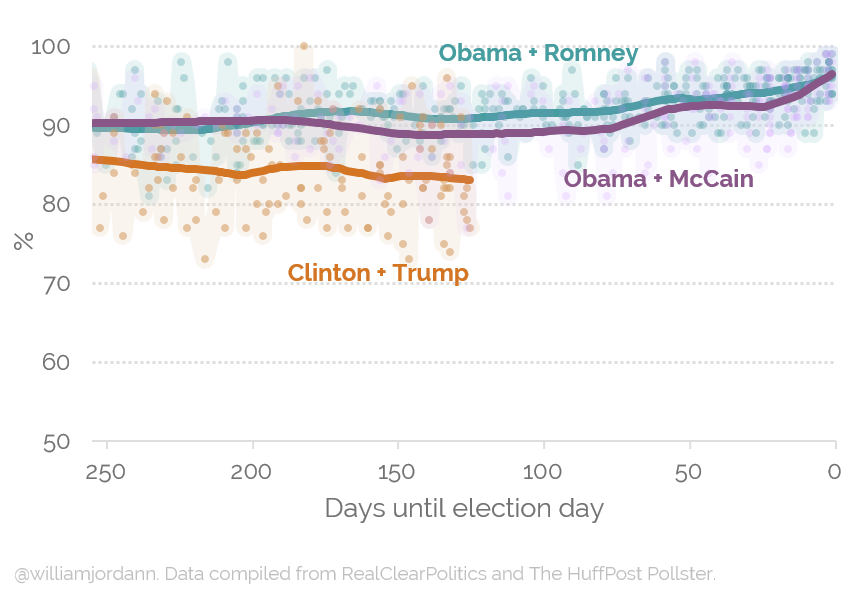Hello, I'm Will Jordan and welcome to The Pulse.
Vice presidential buzz, some context for 2016, and a busy July. Here's what you need to know:
- What’s new?
It’s been an eventful couple of weeks since our last update. Trump found himself wrapped up in an only-in-Trumpland controversy over a tweet featuring an image some called anti-Semitic, while Clinton reached a resolution – of sorts – to a Very Clinton Scandal over her use of private email as Secretary of State. Speculation around vice presidential candidates is bubbling furiously, with Trump expected to make his announcement this week. Meanwhile, the shooting of two black men, followed by the killing of five policemen in Dallas, has set off a new wave of anguish, protest and debate about race and violence in America. - So where has this left the candidates?
Actually, there have not been any dramatic changes in the state of the horserace since the end of June. YouGov’s poll tracking the race has had Clinton ahead by 5 points for two weeks running, and poll averages look similar – however, there have not been many polls released over the past week. So we’ll have to wait to see the true impact of the tweets and the emails. The latest YouGov survey also lists the Libertarian Party candidate Gary Johnson and likely Green Party nominee Jill Stein as options; they receive 4% and 3%, respectively. - But, for now, that good for Hillary Clinton? Is it great?
It’s actually difficult to say. According a nifty widget created by The Washington Post, George W. Bush tied with John Kerry in 2004, 120 days before the election, where we were as of Monday. Barack Obama led John McCain by 5.5 points in 2008, and led Mitt Romney by 2.5 points in 2012. A lead the size of Clinton’s at this point has, historically, preceded November victory. That’s a big part of why Nate Silver’s website, FiveThirtyEight, gives Clinton a 77.6% chance of defeating Trump based on current polls alone. - Isn’t 2016 a bit …unique?
It’s true, 2016 is different from past elections in some important ways. For one, Donald Trump trails Hillary Clinton in fundraising and advertising by huge margins. If he won, he would be the first US president without any political or military experience. Clinton would be the first woman ever elected. All of these could affect the race in unpredictable ways. Then there is the matter that Trump and Clinton are the most unpopular nominees in modern political history – in fact, about a quarter of Americans dislike both. This leads to an interesting situation where both Clinton and Trump are polling at relatively low numbers in a head-to-head.
Not all of this is third party support – only recently have pollsters started explicitly naming candidates like Johnson and Stein. But it shows that there is an unusually large number of voters presently uncommitted to Trump or Clinton, who could swing the margin – or elevate a 3rd party candidate – in unpredictable ways if and when they make a decision. Or not. We will probably know by the end of July— - The end of July?
It’s still possible a number of voters will eventually “come home” to the major party nominees, as in past years. Several events in July seem likely to rally some partisan stragglers.
- Both candidates are expected to choose a running mate soon, another potential opportunity to throw red meat at reluctant constituencies within the party. Though political science has suggested the impact has small (as Trump seems to have learned himself).
- Primary rivals are also expected to come off the sidelines: Ted Cruz has said he would speak at the GOP convention, as will Paul Ryan. Bernie Sanders is expected to formally endorse Hillary Clinton at rally on Tuesday. For both Clinton and Trump, this could really matter: in the latest YouGov/Economist Poll, only 53% of Sanders primary supporters back Clinton in a match-up with Trump, while only 48% of GOP voters who backed non-Trump candidates in the primary now support the nominee.
- Then there are party conventions (Republicans have theirs July 18-21, Democrats July 25-28), which are, ideally, thrilling displays of party unity featuring ostentatious burying of hatchets, soaring speeches by party luminaries, and balloons. Less ideally, they involve violent demonstrations and plots against the presumptive nominee.
More on that next week.
Extra reading:
- Clinton leads Trump by just 4 points in Nevada (Obama won by 7). Johnson receives 5%, followed closely by "None of these candidates" at 4% – this is an actual option listed on Nevada ballots.
- A new ABC/Washington Post Poll finds that 56% of the public – including many Democrats – disapprove of FBI Director James Comey's decision not to recommend criminal charges for Hillary Clinton. A YouGov poll last month showed 48% already thought she had done something illegal.
- An analysis of new Pew Research polling on 2016 shows Clinton is doing better against Trump than Obama did against Romney in June 2012 – among almost every demographic group
- ICYMI: Barack Obama could be an surprisingly useful surrogate for Clinton when it comes to white voters (so could Joe Biden, perhaps less surprisingly)
The Pulse is a weekly newsletter YouGov has launched ahead of the 2016 primaries and general election to give readers a one-stop-shop for the latest polling-related news from the campaign. In addition to YouGov’s own extensive coverage of the election, The Pulse gives you the five things you need to know about the state of the campaign each week.









